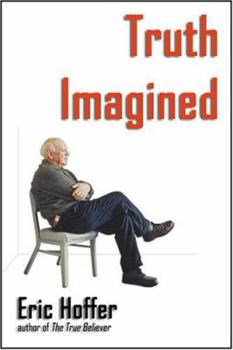Truth Imagined
Select Format
Select Condition 
Book Overview
Blind as a child, Eric Hoffer--one of America's most important thinkers--regained his sight at the age of fifteen and became a voracious reader. At eighteen, fate would take his remaining family,... This description may be from another edition of this product.
Format:Paperback
Language:English
ISBN:1933435011
ISBN13:9781933435015
Release Date:December 2005
Publisher:Hopewell Publications
Length:120 Pages
Weight:0.45 lbs.
Dimensions:0.1" x 5.9" x 9.1"
Customer Reviews
2 ratings
Insights into the life of Hoffer
Published by Thriftbooks.com User , 18 years ago
I first read The True Believer over a year ago. No other book has made more of an impression on me. The insights into human nature it contains never cease to amaze me. I refer to it often and I never fail to be amazed at how current events prove Hoffers assertion correct over and over. I was rather surprised when I read this autobiography of hoffer. I was surprised at how small the book was and slightly surprised at how little he discussed writing The True Believer. The book describes Hoffers life as a transient and the many characters he met and worked with during this time. There are enough entertaining stories in the book to keep any reader engaged, even if youve never read any of Hoffers books. Reading the book really gives you an idea of just how intelligent Hoffer was. Hoffer was knowledgable on a wide range of subjects, from Chemistry and Philosphy to advanced Mathmatics and all sorts of sciences.
The growing years of a remarkable "thinker" for our times
Published by Thriftbooks.com User , 18 years ago
Anything and everything by Eric Hoffer is always fascinating; this story of his life, and his responses to dozens of people he met, is no exception. This is book is an adventure, his life as a bum and the experiences until 1942 which shaped his personal outlook and created his rugged individualist philosophy of life. His first book was the classic 'True Believer' in 1951, significant enough to help shape the ideas of President John F. Kennedy. Hoffer is deservedly famous for it and 10 other such books. This one should be read in connection with any of them. Originally published in 1983, near the end of his life, it covers his career up to the start of his career as a longshoreman/intellectual in San Francisco. One element dominates, his insatiable curiosity and interest in other people. For that reason, he would undoubtedly object to be called an "intellectual". Yet, the term fits; this book appeals to the intellect, and he was an intelligent and informed person. The difference is how he related to people and ideas; many modern intellectuals relate only to books, documents and other abstractions. When Hoffer read Michael de Montaigne he "felt all the time he was writing about me" because he had learned the same sort of common sense and practical wisdom from the bums, hobos, homeless and other drifters who were always a part of his life. As Casey Stengel once said, "You can learn a lot by listening". The five paragraphs of his 23rd Chapter are a gem for every historian, fully equal in common sense and beauty to the Biblical 23rd Psalm. Skip the first paragraph if you want; the other four explain history and Hoffer better than anything else I've read. "History is made not by irresistible forces but by example," sums up Hoffer's style; an aphorism in the style of Montaigne, with the power of dynamite. Like dynamite, history is deadly if the anecdote is wrong, and such errors are easy to make; but, in the hands of a good historian, it shows how everyday events are illuminated by history. His 24th Chapter explains far more of modern economics than anything from Adam Smith to Alan Greenspan; had either economist learned to sum up Western Civ more astutely, the world would be far more peaceful, benign and just. During the Great Depression of the 1930s, with only $50 in hand, Hoffer learned a society without money means "there is no freedom of choice, since it is ruled by sheer power, and no equality, since brute force cannot be distributed." These two chapters, 11 short paragraphs in all illustrated by two clarion anecdotes, are worth the price of the book. The rest is interesting in explaining how he reached these two ideas and became one of the most significant intellectuals -- he'd prefer "thinker" -- who is more relevant today than ever before.




